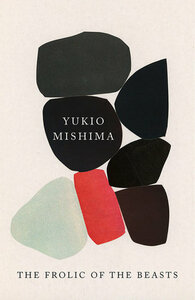Take a photo of a barcode or cover
challenging
dark
mysterious
sad
slow-paced
Plot or Character Driven:
Character
Strong character development:
Complicated
Loveable characters:
No
Diverse cast of characters:
No
Flaws of characters a main focus:
Yes
dark
emotional
mysterious
reflective
sad
Plot or Character Driven:
A mix
Strong character development:
Yes
dark
reflective
tense
medium-paced
Loveable characters:
Complicated
dark
emotional
reflective
sad
tense
medium-paced
Plot or Character Driven:
Character
Strong character development:
Complicated
Loveable characters:
Complicated
Diverse cast of characters:
No
Flaws of characters a main focus:
Yes
Truth be told, Yukio Mishima’s beautiful, rich prose is the main reason for my 4-star rating and the quality of writing itself has made this read extremely satisfying. Thorough descriptions of emotional turmoil are something I usually enjoy a lot and Mishima fed me some subtle yet powerful ones throughout this novel.
Overall, I enjoyed the characters and their story, I was never bored by it, though the plot felt pretty mundane – definitely tragic but quite predictable.
As for the things I didn’t enjoy… weird (but not awful) way of describing female characters? Breasts breasts breasts? Voluminous breasts? Breasts everywhere? It could have been a lot worse, just a small eyebrow raiser whenever it caught me off guard.
And! The pacing got a bit weird near the end but it didn’t *really* impact my reading much since the novel is rather short anyway— still, the perfect length for what it had to convey.
Это было интересно. История написана как отсылка на одну из пьес театра но. Мне понравилось, как Мисима вписал детали театра в сюжет и внешность героев.
It takes about 50 pages to set up the premise. I wish the backstory, which is told through a series of clunky flashbacks, better captured the nature of memory—specifically, the way it flits from one association to another (cf. the Sound and Fury). The dialogue is occasionally clunky: 'It's my song. Is it forbidden to hum a tune? It's my song I tell you.' This is probably the fault of the translation; at least Mishima’s descriptions are still beautiful:
‘Kōji suddenly looked back in the direction of the ice plant. He watched as rays of golden light cascaded from the entrance—the door having been left open—spilling onto the dark concrete floor. It was a great outflow of silent, futile light—almost mystical in appearance. He wondered why such a great amount of light jostled for space in that one place at night.’
Once the premise is set up, I really loved it. I particularly enjoyed the invalid Ippei. He is like a ghost that haunts the throuple; a mask that they project their anxieties onto (what a great nod to Noh Plays!). I just wish we spent more time with the throuple, the story ends too quickly (and a bit awkwardly).
‘Kōji suddenly looked back in the direction of the ice plant. He watched as rays of golden light cascaded from the entrance—the door having been left open—spilling onto the dark concrete floor. It was a great outflow of silent, futile light—almost mystical in appearance. He wondered why such a great amount of light jostled for space in that one place at night.’
Once the premise is set up, I really loved it. I particularly enjoyed the invalid Ippei. He is like a ghost that haunts the throuple; a mask that they project their anxieties onto (what a great nod to Noh Plays!). I just wish we spent more time with the throuple, the story ends too quickly (and a bit awkwardly).
medium-paced
Plot or Character Driven:
Character
Strong character development:
Complicated
Loveable characters:
Complicated
Definitely a low-priority in the Mishima oeuvre. I think a staged version would be more interesting, especially given this is a re-imagining of a Noh play.
challenging
dark
reflective
slow-paced
Plot or Character Driven:
Character
Strong character development:
Complicated
Loveable characters:
No
Diverse cast of characters:
No
Flaws of characters a main focus:
Yes
"Kōji was afraid of this thick, gravy-like rural night. The graphic quality of everything that lay in slumber during the day awakening all at once was so much more physical than nights in the city, and the night itself was like a colossal, intense piece of meat saturated with hot blood."
Mishima's descriptive writing is beautiful and incredibly unique, not only when it comes to landscapes and scenery, but also when describing his characters. He uses strong and evocative metaphors as descriptions of people's appearances and actions, which gives each of the characters a very unique image.
The frolic of the beasts seems to be playing with the nature of what we hide, and what we reveal; our masks so to speak. There's an undercurrent throughout this story of the vile parts of human souls which lie buried under a mountain of justifications, social restrictions and honor; the internal hidden by the external which will occasionally rear its ugly head and wreak havoc.
In the end, guilt, desire and letting go finish off the story. There's alot of subtle emotions and investigations on human intricacies laid throughout the novella, and I believe what Mishima is trying to do here is to showcase many of the ways in which the strings of life and fate tug and pull us in certain directions.
What drives a human to act out, to commit a sin? How do you progress from that point?; repentance, forgiveness, moving on? And what about desire? Can it be forgotten, can It be hidden and imprisoned? Or must our forbidden and carnal vices eventually show themselves in one way or another?
15th book of 2020, and my 5th Mishima. As for writers' lives, Mishima has one of the most interesting, and tragic.
This is a 'lesser' book. A young student falls in love with a woman who has a husband, something terrible is done (which I won't say) and the husband, Ippei, becomes an 'invalid'. He can't talk much, and rarely understands anything. He tends to look about himself with a stupid grin on his face. Mishima has always been good at capturing interesting characters. Ippei in this is possibly one of my new favourites, as interesting goes. As for the plot, it's fairly mundane: picnics, walking, sex and reflecting. And as I've grown to expect in Mishima's work, violence and death.
Koji remembered his geta and Kimi's sandals that they had left in the forest in Urayasu that night. They had been kicked off carelessly - surely no one would mistake them for footwear discarded at the scene of a suicide. He hoped they would be taken by the incoming tide and carried out to sea as the tide ebbed, and how, if they weren't, then they would probably rot, half-immersed in water like a scrapped vessel. In the course of time, they would be eaten into completely and transformed into a dwelling place for an infestation of sea lice. They would cease to be geta and sandals. Having once belong to man, they would instead melt into the great multitude of unearthly, formless material phenomena that exist on earth.
This is a 'lesser' book. A young student falls in love with a woman who has a husband, something terrible is done (which I won't say) and the husband, Ippei, becomes an 'invalid'. He can't talk much, and rarely understands anything. He tends to look about himself with a stupid grin on his face. Mishima has always been good at capturing interesting characters. Ippei in this is possibly one of my new favourites, as interesting goes. As for the plot, it's fairly mundane: picnics, walking, sex and reflecting. And as I've grown to expect in Mishima's work, violence and death.
Koji remembered his geta and Kimi's sandals that they had left in the forest in Urayasu that night. They had been kicked off carelessly - surely no one would mistake them for footwear discarded at the scene of a suicide. He hoped they would be taken by the incoming tide and carried out to sea as the tide ebbed, and how, if they weren't, then they would probably rot, half-immersed in water like a scrapped vessel. In the course of time, they would be eaten into completely and transformed into a dwelling place for an infestation of sea lice. They would cease to be geta and sandals. Having once belong to man, they would instead melt into the great multitude of unearthly, formless material phenomena that exist on earth.






